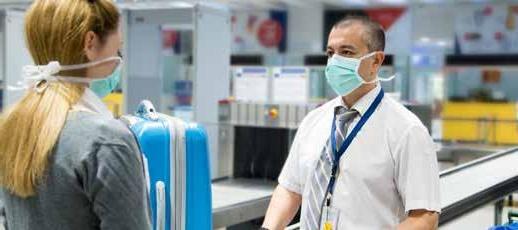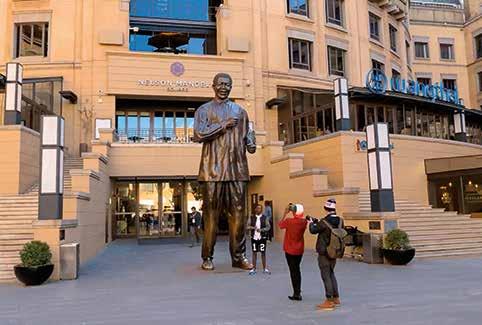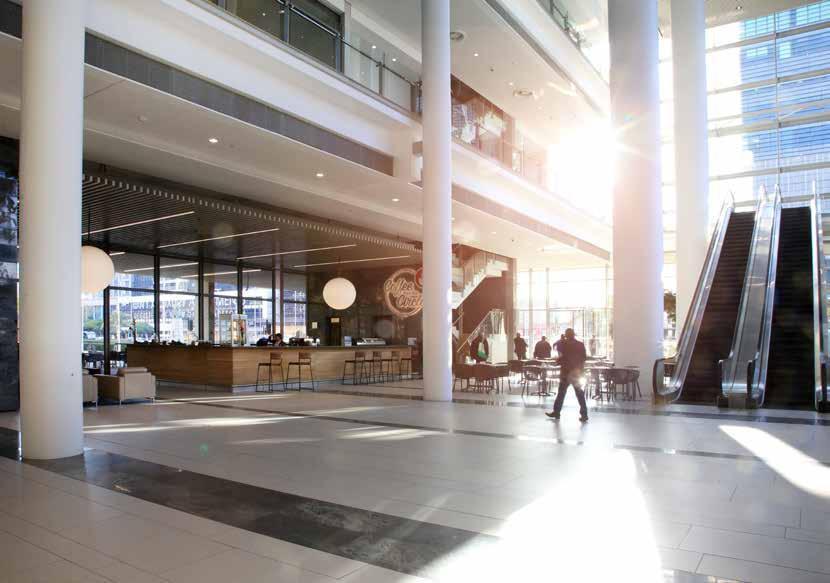
22 minute read
Tidbits
by 3S Media
Meetings’ must-know minutia
Covid-19 protocols for local tourism industry launched
Advertisement

Towards the end of May, the Tourism Business Council of South Africa (TBCSA) launched the Tourism Industry Standard Protocols for Covid-19 Operations to better guide the tourism industry on how to maintain health and hygiene standards as set out by the World Health Organization (WHO), the National Institute of Communicable Diseases (NICD) and the Department of Health (DoH).
“The tourism industry has developed comprehensive protocols for the operation of all types of tourism businesses or facilities in times of the Covid-19 pandemic. The protocols align with the WHO, NICD and DoH guidelines and advice, and will be revisited as required on an ongoing basis. They cover customer information, PPE, physical distancing, and sanitisation and hygiene practices, among others, for staff and customers,” says the report (access it here: https://cutt.ly/JyV7d4g).
262 South Africans stranded in India come home

On 24 May 2020, 262 South Africans who were stranded in India landed back on home soil. The group arrived late in the evening and were transported to Indaba Hotel in Fourways in minibuses, where they were to spend 14 days in quarantine.
The South Africans were repatriated at a cost of around R15 000 each, which covered their flights, accommodation, food and testing for Covid-19.
Speaking on the trip home was Sadhana Ryan, who said she was very grateful to be back home: “We are very comfortable and really have nothing to complain about. We are quarantined in our rooms for at least five days until the health authorities come and proceed with testing.”

AfDB lends €188 million to Mauritius in fight against Covid-19
Towards the end of May, it was announced that the Mauritian government had launched the Covid-19 Rapid Response Facility (CRF) in an effort to fight against the ongoing pandemic.
The CRF will be supported through a €188 million (R3.6 billion) loan from the African Development Bank (AfDB) to Mauritius, with the aim mitigating the adverse economic and social impact of the disease.
The response will focus on three pillars that will: improve healthcare systems; better protect livelihoods, income security and access to essential goods and services; and bolster the private sector as a strategy for the recovery of the economy.
The Indian Ocean island has managed to remain fairly insulated from the virus, reporting 332 cases at the end of April, with just two new cases reported towards the end of May.
Two-thirds of South Africans worried about a post-pandemic future

Figures from a Stats SA survey point to a nation that is very concerned about what the future will look like post Covid-19.
“8.1% of respondents reported that they lost their jobs or had to close their businesses, and 1.4% became unemployed. Almost 9 in 10, or 89.5%, respondents who were employed before the national lockdown remained employed during the lockdown,” notes Malerato Mosiane, employment statistician at Stats SA.
Income statistician Werner Ruch says that the results indicate an increase in the proportion of those who derived their incomes from savings and investments.
“They reported that loans from friends, family and/ or businesses increased from 1.7% to 3.3%, and claims from UIF increased from 0.3% to 2.1%,” explains Werner.
The survey further indicated that about 33.4% reported that Covid-19 and the national lockdown would have no impact on their ability to cover their financial obligations, while 18.7% and 18.2% of respondents indicated that it would have a major or moderate impact, respectively.
South Africa, much like the rest of the world, is still finding its way forward through the impacts of the Covid-19 pandemic. Meetings magazine talks to Amanda KotzeNhlapo, the chief convention bureau officer, on the role the business events industry can play in our country’s economic recovery.

Part of the solution



The year kicked off on a high note and the outlook on what 2020 held was positive. But by late March, strict lockdowns were implemented, with the global novel coronavirus pandemic casting uncertainty over much of the economy. Many local businesses have not survived, and countless others still face a long road ahead in their recovery.
Cue the South Africa National Convention Bureau (SANCB).
Established in 2012, the SANCB has played a key role in bringing muchneeded structure and support to the business events industry, being a major economic contributor. As it faces its greatest challenge yet, Amanda is positive about what the industry can achieve, even in the face of adversity.
“It is the meetings industry that is currently driving the Covid-19 messaging, and what meetings and conventions are all about is coming up with solutions. In order to be change agents, this is where we need to currently focus our attention,” notes Amanda.

SOLD ON SOUTH AFRICA In mid-April, a massive R500 billion economic stimulus package was announced, a sizeable amount of which will be used to assist local business at all levels – from small, medium and micro enterprises, right through to those with turnovers of more than R300 million annually. While this will go a long way towards providing some much-needed financial cushioning as the pandemic runs its course, how do we ensure we are able to build from here?
“This is when we need to take stock and organise ourselves to sell South Africa better,” says Amanda.
With borders remaining shut until lockdowns are eased further, once it is safe to do so, industry experts predict that the recovery of traveland tourism-related business will be recognised in domestic markets before it is felt anywhere else.

Amanda Kotze-Nhlapo, SANCB

“We can’t be ignorant to the impact of the crisis but we also see the opportunity, and now, more than ever, the meetings industry needs to recognise that it is part of the solution,” emphasises Amanda.
One thing that has come through very clearly through the pandemic crisis, Amanda says, is that we are social beings who thrive on face-toface engagement.
On meetings taking place virtually, she doesn’t believe this can ever outright replace the value of an in-person experience.
“Many are asking if, going forward, we will now meet virtually. Digital has been a platform for engagement at a time when it was most needed, and while I expect that it will continue enhance meetings, to some extent the human element is lost and they can never provide the same connections and rich experiences as a live event,” she asserts.
BID SUPPORT PROGRAMME (BSP)

The SANCB plans to undertake a full review of South Africa’s BSP to improve the outputs driven by the programme, including its efficiencies and effectiveness in securing business events for the country. The review process will cover all elements of the BSP from leads sourcing process, the evaluation and qualification process, including the procurement and contractual agreement that SAT sign with clients.
INDUSTRY COMMITMENT Despite the uncertainty that has seen a slowing or even freezing of many businesses, the SANCB is more committed than ever to implement strategies to bolster industry as a whole so it can weather the storm.
“We are working with government, associations and various venues and suppliers to come together and find the solutions necessary to assist the industry as far as possible during this time,” says Amanda.
The SANCB has, over the years and through its bidding support programme, been pivotal in attracting some of the largest international business events to ever take place on South African soil. The pandemic and ensuing lockdowns have impacted on some of its own events, including Africa’s Travel Indaba, but Amanda feels this is truly a time when the bureau can show its strength and leverage each opportunity.
In addition to its discussions with various players within the MICE industry, the SANCB is in talks with the organisers of the cancelled or postponed events in which it is currently involved to explore the ways such an event can possibly still take place, even digitally.
“What we want to do for those events is still identify how we can do gifting and market the country, so that guests and delegates still know that we are the host, the opportunity exists that a much bigger number of delegates could virtually experience our country,” Amanda enthuses.
“This gives us an opportunity to look at our own processes in more depth and explore aspects such as how we can improve delegate boosting, how we bring technology to the fore, and what training is needed to do so,” she says.
Whether it be opening addresses being digitally broadcast or implementing delegateboosting initiatives to ensure that no numbers are lost, the SANCB has its work cut out for itself; however, Amanda’s determination is unwavering: “We’ve got a job to do and, when our borders open, we need to be ready.”


www.southafrica.net/gl/en/business


IN THE FACE OF ADVERSITY, WE WILL RISE
In a matter of months, Covid-19 has wreaked havoc across the world, bringing commerce and whole industries to their knees. Meetings understands what this means for the business events industry and how we can move forward.


There may be a handful of individuals alive today who can remember the 1918 influenza pandemic that is estimated to have infected close to a quarter of the world’s population and killed some 50 million people.
Little more than a century later, on 17 November 2019, the first case of severe acute respiratory syndrome coronavirus 2, or SARS-CoV-2, is thought to have made itself known. ‘Patient zero’, a 55-year-old man from Wuhan in the Hubei province of China, is
“When the time is right, WTTC and the global private sector will be ready to help and support the government and countries to recover.” Gloria Guevara, president and CEO of WTTC
believed to be the very first person to have contracted what scientists say is a zoonoticoriginated virus that is airborne and easily transmitted to and between humans, resulting in the Covid-19 disease.
In the months that have since passed and at the time of going to print, an alarming number of infections were recorded. Over a period of just two months, between 18 March and 19 May this year, global figures have shot up from nearly 250 000 cases confirmed and

more than 10 000 deaths in March, to over 5 million cases and 327 000 deaths in May.
While more than a third of all confirmed cases have made a full recovery, the virus has a mortality rate of around 1.4%, and those who are elderly or have various underlying conditions are particularly susceptible.
SA ON LOCKDOWN The surge in cases has seen many countries put in place rigorous measures to mitigate

the contagion of infections and prevent a dizzyingly steep upward incline that completely overwhelms healthcare systems. South Africa has been no exception to this.
On 15 March 2020, President Cyril Ramaphosa declared a national state of


disaster. By then, 61 Covid-19 infections were confirmed, with the first case announced 10 days earlier. Just over a week later, this number rose to 402. This led to stringent measures being put in place to contain the virus in the form of a three-
USEFUL RESOURCES

sacoronavirus.co.za worldometer.info/coronavirus theplanner.guru/2020/03/30/covid-19- resources-for-the-events-industry saaci.org/coronavirus-update eventscouncil.org/coronavirus ufi.org/industry-resources/coronavirus pcma.org/coronavirus-business-eventsprofessionals-need-to-know-faq uifecc.labour.gov.za/covid19/ufiling.co.za/uif
HOW DO WE COME BACK FROM THIS?

#flattenthecurve has become an important driver in reducing the spread of the virus and eradicating this as far and as fast as possible without overwhelming healthcare systems. It will take time for a recovery and some of the measures WTTC would like to see in place once the Covid-19 threat is under control include the following: Improve travel facilitation: Remove or simplify visas wherever possible, reduce the cost, improve processing times where practical, accept other visas when appropriate, and introduce more efficient technologies for seamless and secure travel. Remove barriers: Ensure that unnecessary barriers are removed or relaxed to alleviate pressure at ports and airports, including the temporarily lifting of the 80-20 slot policy and implement flexible working visas for the industry in some countries with existing limitations, especially in hospitality and tour operation. Ease fiscal policies: Reduce and remove travellers’ taxes that increase the cost of travel, e.g. Air Passenger Duty and similar airport, port and hospitality taxes around the world. Introduce incentives: Introduce relief and incentives to support business continuity for companies that have been most negatively impacted by the virus. SMMEs in particular will take longer to recover. Support destinations: Increase budgets and assign resources for promotion, marketing and product development purposes in destinations when they are ready to welcome visitors again.
“We are confident that government is handling the situation, as well as communication around it, in a responsible and nonalarmist manner.” Glenton de Kock, CEO of SAACI


LET'S HEAR IT!



Meetings supports responsible eventing and is committed to upholding the measures put in place by government as well as various industry associations and bodies to contain the spread of the novel coronavirus. We want to hear from you on how Covid-19 has affected your business and industry. Please share your stories with us on how you are navigating the effects of the virus as well as any tips, tools and useful resources that may be of interest to our readers and audience, by writing to us on heroes@3smedia.co.za or posting on our social media pages.


week lockdown that was then extended by a further two weeks.
“If we end the lockdown too soon or too abruptly, we risk a massive and uncontrollable resurgence of the disease. We risk reversing the gains we have made over the last few weeks, and rendering meaningless the great sacrifices that have been made,” said President Ramaphosa during his address to the nation that announced the extension of the lockdown.
While the country has been praised for its proactive approach to put in place extensive precautions preventing the further spread of the virus, it is having heavy implications on business events and industries across the board.
To support businesses as well as the desperate plight of those who are most vulnerable during the lockdown and pandemic, the South African government has put in place a R500 billion stimulus package, which has already started rolling out funds to success applicants. More information on this can be found on the Department of Employment and Labour and the Unemployment Insurance Fund (UIF) websites (see Useful Resources box on page 7).
SWIFT ACTION Many local organisers had already heeded the call, with major events such as Africa Travel Week (ATW) and World Travel Market Africa being postponed or outright cancelled, even prior to a state of disaster being declared.
“We have had to respond to the current pandemic and the ongoing conversations with our customers whose welfare is our number one priority. Due to the uncertainty in the region and around the world, with many of our clients facing company travel bans, we have taken the decision to postpone the event to 2021, which was due to take place from 2 to 8 April 2020. Our thoughts are with all those affected in these difficult times,” said Carol Weaving, managing director of Reed Exhibitions Africa – organisers of ATW – in a statement released on 13 March.
FEELING THE PINCH The full effects of the virus could potentially be devastating, and according to projections from the World Travel & Tourism Council (WTTC), travel could fall by a quarter in 2020, with millions of jobs lost.
“WTTC figures show the stark impact on the travel and tourism sector of the present Covid-19 outbreak, with analysis now suggesting that up to 50 million jobs are at risk in the sector globally. Travel and tourism has the strength to overcome this challenge and will emerge stronger and more robust by taking all necessary measures to tackle Covid-19 and the understandable concern which surrounds it,” says Gloria Guevara, president and CEO of WTTC.
Glenton de Kock, CEO of the Southern African Association for the Conference Industry (SAACI), has, meanwhile, encouraged that a responsible course of action be taken by the events industry.
“We do not yet know with any degree of certainty what the total impact will be on our industry or the global economy. That uncertainty is difficult and uncomfortable, and it is playing a large role in influencing decisions that have an impact on all of us – personally and professionally… Sharing knowledge and information in real-time, sharing concerns and potential solutions, as well as accessing the most current and authoritative information from numerous official bodies and agencies will aid us in helping each other and the industry as a whole. Together we will manage our way through this crisis,” emphasised Glenton.
THE EFFECTS OF COVID-19 ON THE EVENTS INDUSTRY
Taubie Motlhabane, CEO, Cape Town International Convention Centre
I could not lead without a strong and committed executive team to support me. Our staff continue to show massive professionalism and commitment to our clients and stakeholders, and we are a very fortunate organisation to have such people working here. The CTICC is committed to a triple-bottom-line approach, focusing as strongly on its environmental and social impact as it does on profit margins. It is now more important than ever that our focus on people is sharpened. We are working with various government and local organisations in the Western Cape and are stepping up to the plate to assist where we can in the humanitarian impact of the Covid-19 pandemic. Our strategy is to encourage event organisers to postpone and not cancel events. We are honouring our 2020 rates for existing once-off events that postpone to 2021. We are ensuring that our valued suppliers – most of whom are unable to work during this period – are paid on time and all accounts have been reconciled and are up to date. In our commitment to working with our stakeholders and the relevant authorities to help flatten the curve of Covid-19, the CTICC’s venue facilities are available to be utilised to help mitigate the impact and spread of the virus. This action of being part of the solution will put us in a position to recover more quickly, and get back to the business of hosting events. Our clients have been very positive and hopeful of the future. This has been heartening and is a great boost to our entire team. The way we do events will undoubtedly change and that is a consideration for venues and planners alike. In 2019, we established and launched our own events collection, comprising two events, namely: The Gift Fair, a platform for small-scale businesses, and the AllSport Expo, which showcases everything from health, nutrition, medical and wellness products to sporting equipment, activewear, and cutting-edge technology. We will continue to search for new ways to optimise our business by initiating new event experiences that create economic opportunities. Most importantly, we look forward to supporting our staff to re-acclimate from working at home to being back in the office under what is likely to be very different conditions, post lockdown.

Ellen Oosthuizen,
chairperson, PCO Alliance Network
We represent one section of the industry that is suffering dramatically under the Covid-19 restrictions. With the current situation, we are certain that some of our members may well lose their businesses. This will not only result in the closure of their businesses but in retrenching their staff too. The knock-on effect of loss of business placement to the hospitality industry, in its entirety, will include hotels, function venues, technical equipment suppliers, entertainers, decor companies, speakers and hiring companies, thereby furthering thousands of job losses. While we are all innovating and turning to whatever means possible to support revenue streams, we urge the events industry to stay home and stay safe!
Justin Hawes, managing director, Scan Display
We have been updating all stakeholders regularly and have made sure that all staff members have access to company communication via email and WhatsApp groups. It’s important that they are made aware of our plans and how we are managing the crisis. We have put a lot of time and effort into investigating the different relief options and applying for some temporary relief for our staff. During this time, we are also thinking laterally about how we can use our products in new ways, as solutions to some of the challenges of the Covid-19 pandemic. One thing that has been made clear during this period of isolation and lockdown is the value of face-to-face communication. Nothing beats it. I really believe that conferences and exhibitions will continue to provide value that online communication just can’t. As a result, I see the industry playing an important role in the future, even if it takes a while to pick up again.

Mike Lysko,
CEO and founder, Flock Eventing Platform
A few years ago, holding an event with a camera, a microphone and a computer screen might have seemed crazy but, with improved technology and the current health crisis,our view on traditional events has changed. The great news for event hosts and planners is that it is not only still possible to bring people together – we’re able to create completely online events with an almost similar, and in some cases better, experience. Case in point: in May 2018, millions of investors turned on their computers to watch Warren Buffett’s comments at the Berkshire Hathaway Annual Shareholders meeting. In September 2019, Apple’s iPhone 11 launch event attracted 1.8 million people to its live stream. For event managers, the sudden growth of online events creates new ways of connecting with larger audiences. A recent survey by the US-based business events industry body PCMA found that 67% of respondents will use technology to remotely participate in events in the next three years. In a world where people can’t or don’t want to travel, hosting an online event may be the way of the future – and could redefine the way we reach our audiences. We think the future holds more of a hybrid approach to events than previously, and it will be a stronger combination of physical and online events. To truly engage audiences, though, you’ll need to deliver a standout online event experience that delivers real value to attendees.

John Ingram,
director, The HiSide Group
It hit us hard, hit us suddenly and, now that the realities have sunk in, its time to get over the remorse and start planning for life after Covid-19. The events industry will never be the same again and this poses a real challenge to all, especially those who rely heavily on commissions from suppliers. The first big reactionary change that has occurred is the use of virtual communications. This technique has been around for quite a while but, as humans, we prefer person-to-person interaction, even at the expense of sending delegates half way around the world and setting up in glamourous hotels at enormous expense. This was the way budgets were drafted and everyone made a living from this conference/ events concept. Will this ever happen again? Yes, but I would suggest to a lesser extent. Over the next six months of our full or partial lockdown, we will have re-educated our clients to think smarter and use technology better to run events. Once they see the value of this, why would they revert back to the old ways? Some will, and some will mix it up with a bit of both. Example: we had a conference planned for April with a budget of R3.5 million, which couldn’t be postponed and had to be cancelled. We replaced the full conference with a virtual concept that included a lot of fun and interactive trimmings, at a new cost of R850 000. If the objectives have been met and outcome is satisfactory, what CEO is going to approve a R3.5 million budget next year? Our challenge now is to embrace the aspects of virtual technology and make sure we can create value through this process. The challenge of earning an income from this virtual business will be tough. It’s not easy, but then what is?










